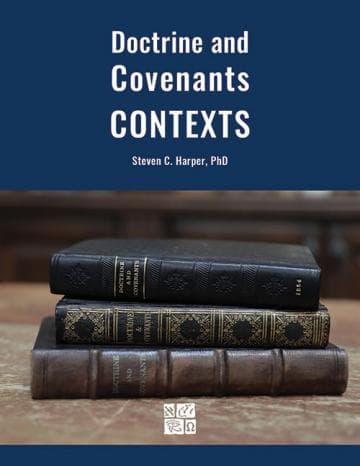Book
136 Chapters

To organize the Church (as Joseph was led by the Lord to do) to be “independent of every encumbrance beneath the celestial kingdom,” you need to make “bonds and covenants of mutual friendship, and mutual love.”[1] The problem was that in early 1832 there was a lack of friendship and love among Church leaders. Section 78 commanded Joseph, Sidney Rigdon, and Bishop Whitney to travel to Missouri to organize the United Firm with Bishop Partridge and others. Sidney and Bishop Partridge were at odds with each other.
Joseph noted with relief that the Missouri Saints were glad to see them and sustained him as President of the High Priesthood and that Bishop Partridge extended “the right hand of fellowship.” Joseph's history says that between meetings the “difficulty or hardness which had existed between Bishop Partridge and Elder Rigdon was amicably settled, and when we came together in the afternoon all hearts seemed to rejoice, and I received the following revelation given April, 1832, shewing the order given to Enoch and the church in his day.”[2]
The revelation begins with the Lord’s forgiveness for the brethren who have forgiven each other—and a warning not to backslide. The tone is serious and solemn. The Lord is about to organize the leaders of his Church, by covenant, into a firm, an order, or what we might call a corporation. It is to fulfill the command in section 78 “to manage the literary & Mercantile concerns & the Bishoprick both in the Land of Zion & in the Land of Kirtland.”[3] In other words, section 82 organizes the leaders by covenant into the United Firm designed to build Zion by living the law of consecration.
The Lord declares a reason that he has consecrated Zion and its stake in Kirtland to the Saints and why he commands them to covenant with him to consecrate: “that every man may improve upon his talent, that every man may gain other talents, yea, even an hundred fold, to be cast into the Lord’s storehouse, to become the common property of the whole church” (D&C 82:18). Talent in these verses refers to the parable of the talents in Matthew 25, where a talent is a substantial amount of silver or gold. This is a revelation about economics. By Joseph Smith’s lifetime, the word talent in English had taken on the meaning of a natural gift or endowment, enriching the Lord’s usage of it in this revelation.
Section 82 created the United Firm, better known as the United Order, a pseudonym still used in published versions of the revelations.[4] The men named by the Lord in verse 11 met the day after the revelation was given and “resolved, that the name of the Firm mentioned in the Commandments yesterday be Gilbert, Whitney & Company in Zion. And Newel K. Whitney & Company in Kirtland, Geauga Co. Ohio.”[5] They joined the Church’s two storehouses and made them a parent company of the Church’s printing and real estate projects “and named the newly integrated mercantile establishment the United Firm.”[6]
The members of the United Firm were diligent if faltering. They acquired properties in both Ohio and Missouri and published the revelations, two newspapers, and a hymnal. They operated two stores until antagonistic neighbors in Independence, Missouri, dragged Bishop Partridge from his home in July 1833 to tar and feather him, demanding that the Firm shut down its Independence businesses. Then the mob burned the Firm’s printing office and destroyed its press. In Ohio, meanwhile, the Firm struggled with debt and access to credit. Building Zion was expensive and the Saints were often frustratingly stingy. The Lord accused them of saying “we will not go up to Zion, and will keep our moneys” (D&C 105:8).
The Lord finally dismantled the United Firm in section 104 because some of its members broke the covenant they entered as a result of section 82. “I the Lord am not to be mocked in these things,” he told them, after reminding them about the punishments he prophesied for covenant breakers in section 82 (D&C 104:3–10). In April 1834, two years after beginning, the United Firm ceased to function unitedly. Some Latter-day Saints believe that this process ended the law of consecration. That is a little like saying that if NASA ceased operations the laws of rocket propulsion would be nullified as a result. They would not be. The choice not to live the law of consecration does not end the law of consecration.
[1] “History, 1838–1856, volume A-1 [23 December 1805–30 August 1834],” p. 213, The Joseph Smith Papers, accessed September 7, 2020.
[2] “History, 1838–1856, volume A-1 [23 December 1805–30 August 1834],” p. 210, The Joseph Smith Papers, accessed September 7, 2020.
[3] “Revelation Book 1,” p. 145, The Joseph Smith Papers, accessed September 7, 2020.
[4] Max H. Parkin, "Joseph Smith and the United Firm," BYU Studies 46:3 (2007): 5–6.
[5] Far West Record, April 27, 1832, Church History Library, Salt Lake City.
[6] Max H. Parkin, "Joseph Smith and the United Firm," BYU Studies 46:3 (2007): 13.
Book
136 Chapters
Items in the BMC Archive are made publicly available for non-commercial, private use. Inclusion within the BMC Archive does not imply endorsement. Items do not represent the official views of The Church of Jesus Christ of Latter-day Saints or of Book of Mormon Central.